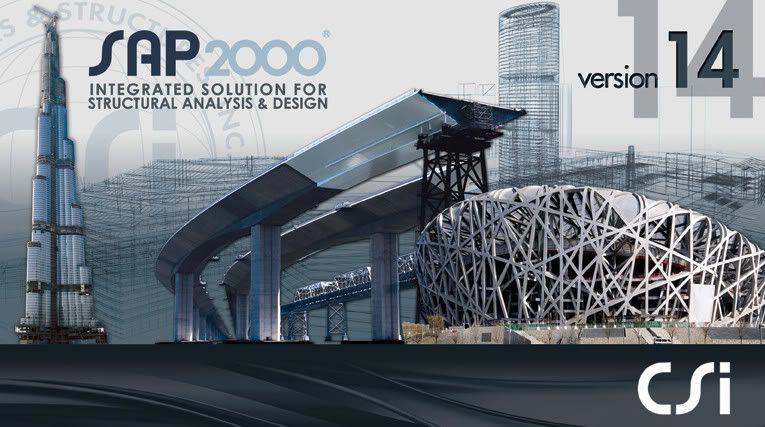
Computers
& Structures, Inc. is proud to announce the release of SAP2000 V14.
The innovative enhancements in this version are categorized below. This
fully integrated product for the modeling, analysis and design of
structures continues to be available in three levels: Basic, Plus and
Advanced.
Nonlinear and Pushover
- Plot functions have been added for shell layer stresses.
- Frame hinges for Section Designer sections “To be Designed” have been enhanced to use the designed amount of rebar when available.
- Section Designer has been enhanced for the display of fiber-model PMM surface.
- The default material properties for concrete have been modified to improve convergence behavior.
- The tangent stiffness used for the iteration of fiber hinges and multi-linear links has been changed to improve convergence.
Dynamics
- Material-based damping is now available for linear and nonlinear direct-integration time-history analysis.
- Material-based damping is now available for steady-state and PSD analysis.
- Stiffness-proportional damping now uses initial stiffness instead of tangent stiffness to improve the consistency of results and convergence behavior.
- The rigid-response calculation in response-spectrum analysis has been enhanced for NRC and general use.
- Base reactions for response-spectrum and modal time-history analysis have been improved for springs and grounded link supports to better capture missing-mass effects.
- Base reactions no longer include constraint forces at restraints, for consistency.
Bridge Modeling and Design
- AASHTO LRFD 2007 superstructure design for precast concrete composite sections has been implemented. Checks include: stress, flexure, and shear (using MCFT). Show me how Automated Seismic Design of Bridges works
- Fully automated bridge design check per AASHTO Guide Specifications for LRFD Seismic Bridge Design 2009 has been implemented, including pushover analysis when required.
- Automated handling of secondary prestress force has been implemented for the AASHTO LRFD 2007 superstructure flexural design check for prestressed concrete box girder sections.
- The AASTHO/USGS 2007 response-spectrum function has been added.
- Variable girder spacing along the length of the bridge superstructure is now available.
- Variable reference-point location along the length of the bridge superstructure is now available.
- Alignment of shell local axes in generated bridge models has been enhanced.
- The longitudinal discretization of bridge models is now more uniform in complex models.
- Tendons modeled as elements now allow elastic, creep, shrinkage, and steel-relaxation losses to be directly specified.
- The displacements for constrained joints in staged construction are no longer updated for deflection until they are actually added to the model.
New Design Code Related Enhancements
- Eurocode-2 2004 concrete frame design added, without seismic provisions.
- Eurocode-3 2005 steel frame design added, without seismic provisions.
- Australian concrete frame design per code AS 3600-2001 added, including seismic provisions.
- Multiple enhancements made for Indian concrete frame design per code IS 456-2000.
- Multiple enhancements made for Chinese 2002 concrete frame design.
- Multiple enhancements made for Chinese 2002 steel frame design.
- Auto-lateral loads added for Eurocode: Wind, Seismic, and Response-spectrum.
- Auto-lateral loads added for Australia: Seismic and Response-spectrum.
- Auto-lateral loads added for New Zealand: Seismic and Response-spectrum.
- Other Enhancements to the Graphical User Interface (GUI) Multiple enhancements have been made to the graphical display for clarity and speed.
- Multi-stepped static analysis of Bridge Live loads acting on frame elements is now available in Plus/Advanced levels without the Bridge license for modeling crane loads, footfall, etc.
- Single-stage construction cases starting from zero are now available in Plus/Advanced levels without the Staged-construction license for modeling separate gravity and lateral configurations, different support conditions, etc.
- The import of StruCAD*3D data files is now available.
- New and updated API functions have been implemented.
Notes:
- To be able to take advantage of the features of the newer CPU's, SAP2000 V14 will not run on some of the older CPU's from Intel and AMD. A CPU that has SSE2 support is now required
- SAPfire® Analytical Engine now includes a multi-threaded solver that can take advantage of the newer multi-core CPUs.
- Support for Microsoft® Windows 2000 and Microsoft® Windows NT has been discontinued. Microsoft® Windows XP without Service Pack 2 may cause unexpected problems when running SAP2000 V14.
- With a 64 bit operating system, SAPfire® Analytical Engine can utilize more than 4 GB of RAM, making it possible to more efficiently solve larger problems.
- The problem size that can be solved & the solution speed increases considerably with more RAM. Vista requires more RAM than XP for the operating system itself.
- OpenGL graphics mode fully utilizes the hardware acceleration provided by a GPU & dedicated graphics RAM.

SAP2000 V14.2.4 Enhancements
Significant new features
- Concrete frame design has been enhanced to improve the smoothing of P-M-M interaction surfaces in those rare cases where they become non-convex due to kinks in the P-M curves.
- A new design overwrite has been added for steel frame design using the "Eurocode 3-2005" code. You may now use the "Is Rolled Section" parameter to indicate whether the member is rolled or welded. The assignment as rolled or welded affects the b/t ratio and therefore may affect the section classification. It may also affect the shear-area calculation.
- The limit on the number of nodes (joints) allowed for exporting a model to a SASSI file has been increased from 9999 to 99999. The exported files are still compatible with the older format if fewer than 10000 nodes are exported.
Server Mega.co.nz
Part 1: http://adf.ly/aB6zg
Part 2: http://adf.ly/aB72N
Part 3: http://adf.ly/aB74r
Password unrar: ifamilyengineering
No comments:
Post a Comment